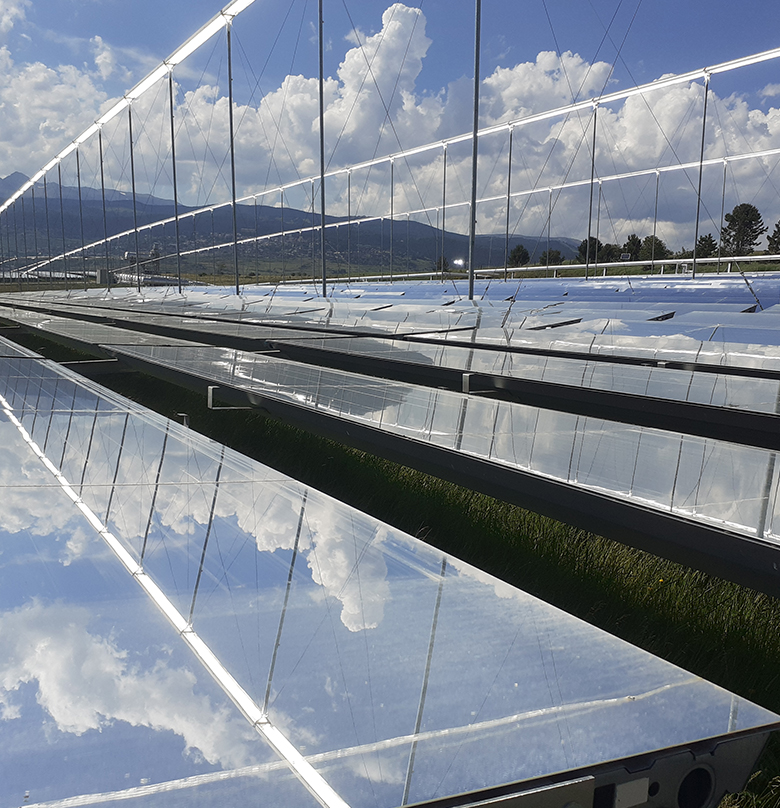Work Plan
List of work packages

Introduction to Work Packages

The SOLARIZE
project aims to enhance the sustainability and efficiency of Concentrated Solar Technology (CST) Research Infrastructures (RIs) through a comprehensive approach that addresses key operational challenges. This initiative is structured around five interrelated work packages designed to optimize resource use while minimizing environmental impact.

WP1: Strengthening and Sustainability of the EU-SOLARIS ERIC
Objectives
Strengthen National Nodes
Foster collaboration between research infrastructure (RI) scientific communities
Improve managerial skills of RI staff
Expand membership
Accelerate synergies
Enhance international cooperation
Description
This work package focuses on reinforcing the operational framework of the EU-SOLARIS ERIC by expanding the National Nodes in participating countries (Spain, Germany, France, and Cyprus) through dedicated workshops aimed at integrating additional research organizations. It seeks to further deepen ties among scientific personnel by organizing annual events such as the Summer School and Doctoral Colloquium, as well as establishing a new Annual Award to recognize outstanding contributions in the field. In addition, mobility programs for early-stage researchers will be promoted to enhance collaboration across institutions. To ensure effective management of the ERIC, staff will receive training in key areas such as innovation management, intellectual property, and communication. The package also includes efforts to expand the ERIC’s membership base by targeting key countries (e.g., Greece, Italy, Portugal, and Türkiye), organizing national events to engage government, research, and industrial stakeholders. Lastly, it emphasizes strengthening international cooperation with research infrastructures in regions such as MENA and Latin America, as well as promoting the role of CST technologies in global energy transition efforts and climate crisis mitigation.
WP2: Pro-active innovation management
Objectives
This work package aims to foster innovation in the Concentrated Solar Thermal (CST) sector by leveraging the capacities of the EU-SOLARIS ERIC. Building upon previous European projects such as SFERA-III and STAGE-STE, the goal is to strengthen the relationship between research infrastructures (RIs) and industry by improving procedures and activities within the ERIC. A key focus will be on identifying the needs of industrial actors at various scales, fostering the exchange of innovations between RIs and industry, accelerating the development of CST standards, and establishing an Industrial Liaison Officer role.
Description
This work package is structured around the integration of research infrastructures into local, regional, and global innovation ecosystems, promoting the innovations within the EU-SOLARIS network, and enhancing the relationship between research institutions and industrial actors. It involves a comprehensive mapping of solar thermal ecosystems at different scales, including their regulatory and policy contexts, to identify entry points for RIs to foster energy transition. A significant focus is placed on co-designing action plans with key stakeholders from selected ecosystems to remove barriers, leverage opportunities, and drive systemic changes in the sector.
A key component is the creation of a portfolio of CST innovations developed within EU-SOLARIS, complemented by strategies to promote these innovations to the industry through standardized materials and participation in industrial forums. The work package will also organize a series of training courses aimed at industrial participants, facilitating knowledge exchange on the latest CST developments. Additionally, it includes active participation in industrial and technology forums and organizing workshops that foster bilateral exchanges between research and industry, touching on key topics like standards, measurement systems, and simulation models. Efforts to accelerate the development of CST standards, both at the national and international levels, are also prioritized, with emphasis on aligning standardization activities with industrial needs. Finally, the role of an Industrial Liaison Officer will be defined and established to promote ongoing engagement between EU-SOLARIS and the industrial sector.
WP3: Improving service capacities of the RIs
Objectives
This work package aims to maximize the utilization and impact of the EU-SOLARIS ERIC and other participating research infrastructures. It focuses on improving accessibility and adjusting services to meet the needs of both industry and research. Additionally, it seeks to identify synergies with other energy sources and design a long-term research strategy aligned with European energy policies.
Description
This work package will first identify new services and facilities needed by users, gathering information through surveys and interviews with key stakeholders, including industry, plant operators, technology developers, and researchers. It will also assess the current services offered by CST (concentrated solar power) infrastructures across Europe, identifying gaps for improvement. Next, it will develop procedures for remote and virtual access to these infrastructures, facilitating broader access to services and data, including free virtual access to simulation tools and datasets. The package will also establish the first node of a European e-infrastructure connecting research centers, with CIEMAT-PSA as the central hub and nodes in DLR and CNRS. Additionally, it will explore synergies between CST and other renewable energy sources, such as photovoltaics, wind power, and energy storage, to foster cross-disciplinary collaboration. Lastly, a long-term research strategy for the CST sector will be designed to guide future investments and collaborations, supporting the transition to a net-zero GHG emissions economy by 2050.
WP4: Greening of CST technologies used at the RIs
Objectives
This work package focuses on defining and implementing best practices to enhance the resource efficiency of Research Infrastructures (RIs) while ensuring sustainability by considering economic, social, and environmental factors. A primary challenge is the high water consumption in Concentrated Solar Thermal (CST) RIs and solar concentration facilities, particularly for cooling and mirror cleaning, especially in arid regions. Additionally, electricity usage significantly impacts the overall efficiency of these facilities. Therefore, the package will prioritize reducing electricity consumption from subcomponents and developing strategies to minimize or eliminate parasitic energy use. Finally, a common framework for assessing the carbon footprint of EU-SOLARIS ERIC will be established, along with proposed mitigation strategies.
Description
This work package encompasses several key tasks aimed at reducing water and electricity consumption in CST facilities. First, it will address the reduction of water usage by implementing techniques such as dry cleaning and evaluating various cooling methods, including dry cooling and co-generation of desalinated water, while establishing best practices for optics cleaning. The carbon footprint of CST RIs will also be assessed through a common framework, identifying mitigation strategies and developing a carbon neutrality roadmap based on the evaluation results. Additionally, the package will focus on minimizing electricity consumption required for operational processes, including optimizing motorization of tracking devices, thermal processes, and hybridization with renewable energy sources. Strategies will be consolidated to lower residual electric consumption while maintaining safe operational conditions, ultimately fostering a sustainable approach in the CST sector.
WP5: Project management and coordination
Objectives
- Coordinating the actions of partners and progress monitoring of the work plan;
- Providing financial and administrative management of the consortium as a whole:
- Ensuring an effective collaboration and information exchange between the partners;
- Becoming a single contact point with the European Commission (EC), and a reliable interface to external stakeholders
and the public at large; - Implement the ERIC’s governance rules and protocols and interacting with the ERIC’s General Assembly;
- Ensuring the high quality of the project outcomes and of the ERIC itself
- Considering relevant gender issues;
- Identifying and mitigating the project risks by performing an effective risk management;
- Management of the ‘Plan for Dissemination,Exploitation, including Communication Activities (PDEC)’
Description
This work package focuses on the management and coordination of the project to ensure compliance with the work plan approved by the European Commission (EC). Task 5.1 emphasizes scientific project management, including the development of a consortium organization, an operational plan outlining project objectives, and a communication strategy using various tools. Task 5.2 involves financial and administrative coordination, where the Project Coordinator (PC) manages fund distribution, resolves discrepancies, and facilitates communication within the consortium. Task 5.3 is dedicated to establishing the governance framework for EU-SOLARIS ERIC, including advisory bodies and service level agreements. Task 5.4 aims to create a Quality Assurance Plan to oversee project management and performance monitoring. Lastly, Task 5.5 focuses on managing the Plan for Dissemination and Exploitation, ensuring effective communication of project results
